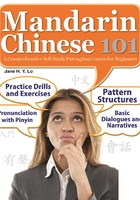
上QQ阅读APP看书,第一时间看更新
Grammar
A sentence with a verbal predicate
A sentence with a verb as the main element of its predicate is called a sentence with a verbal predicate. If the verb takes an object, the object is usually placed after the verb.E.g.
(1) Tā xué Pŭtōnghuà. (He studies Mandarin.)
(2) Tā mèimei kàn diànshì. (His younger sister watches TV.)
And the negative form of this kind of sentence is formed by placing the adverb ‘bù’before the verb. e. g.
(1) Wáng lǎoshī bù jiāo Yīngwén.
(2) Zhāng lǜshī bù xué Pŭtōnghuà.
This kind of sentences can use adverbs to express time, degree, place, etc. and they are always placed before the verb.
For example:
Tā chángcháng hé tā de tóngshì yīqǐ dǎ lánqiú. (He often plays basketball together with his colleagues.)